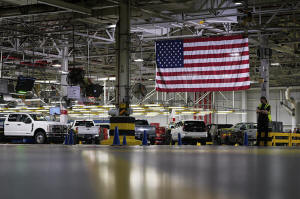New tax break for auto loans could save some buyers thousands of
dollars. But will it boost sales?
[July 14, 2025] By
DAVID A. LIEB
Millions of people receive a federal tax deduction for the interest they
pay on home loans. Under President Donald Trump’s new tax-cut law, many
people for the first time also could claim a tax deduction for interest
on their vehicle loans.
The new tax break will be available even to people who don't itemize
deductions. But there are some caveats that could limit its reach. The
vehicles must be new, not used. They must be assembled in the U.S. And
the loans must be issued no sooner than this year, to list just a few
qualifications.
Here are some things to know about the new auto loan interest tax
deduction:
Candidate Trump promised an auto loan interest tax break
Trump pledged while campaigning last year to make interest on car loans
tax-deductible. He said it would make car ownership more affordable and
“stimulate massive domestic auto production.”
The idea made it into the big tax-cut bill passed by Congress, which
Trump signed into law July 4.
The law allows taxpayers to deduct up to $10,000 of interest payments
annually on loans for new American-made vehicles from 2025 through 2028.
It applies to cars, motorcycles, sport utility vehicles, minivans, vans
and pickup trucks weighing less than 14,000 pounds, a threshold referred
to as light vehicles. But it only applies to vehicles purchased for
personal use, not for fleets or commercial purposes.
The tax break can be claimed starting on 2025 income tax returns. But
the deduction phases out for individuals with incomes between $100,000
and $150,000 or joint taxpayers with incomes between $200,000 and
$250,000. Those earning more cannot claim the tax break.

Millions of buyers could benefit, but millions of others will not
U.S. automobile dealers sold 15.9 million new light vehicles last year,
a little over half of which were assembled in the U.S, according to Cox
Automotive. It says around 60% of retail sales are financed with loans.
After excluding fleet and commercial vehicles and customers above the
income cutoff, an estimated 3.5 million new vehicle loans could be
eligible for the tax break this year, if purchasing patterns stay the
same, said Jonathan Smoke, chief economist at Cox Automotive.
It's the assembly plant, not the automaker's headquarters that
matters
The tax break applies to vehicles assembled in the U.S., no matter where
the company making them is headquartered. All Tesla vehicles sold in the
U.S. are assembled in this country. But so are all Acura brands, the
luxury model of Japanese automaker Honda.
Last year, 78% of Ford vehicles sold in the U.S. were assembled in this
country, according to Cox Automotive. But customers wanting the tax
break will need to pay attention to specific models. While the Ford
Mustang is assembled in Michigan, the Mustang Mach-E is built in Mexico.
General Motors assembles all of its Cadillacs in the U.S. But just 44%
of its Chevrolets sold last year were assembled in the U.S., and just
14% of Buicks, according to Cox Automotive. That's a lower U.S-assembled
rate than Honda (60%), Toyota (52%) and Nissan (48%), which all are
headquartered in Japan.
[to top of second column] |

An American Flag at the Ford Motor Company Kentucky Truck Plant is
seen during a media tour for the launch of the 2025 Ford Expedition
in Louisville, Ky., April 30, 2025. (AP Photo/Carolyn Kaster, File)
 Taxpayers could save hundreds of
dollars a year
The average new vehicle loan is about $44,000 financed over six
years. Interest rates vary by customer, so the savings will, too. In
general, the tax deduction will decline after the initial year,
because interest payments on loans are frontloaded while principal
payments grow on the back end.
At a 9.3% interest rate, an average new vehicle buyer could save
about $2,200 on taxes over four years, Smoke said. The tax savings
would be less on a loan at 6.5%, which is the rate figured into
calculations by the American Financial Services Association, a
consumer credit industry trade group.
Some people also could see a reduction in state income taxes
Whereas the tax deduction for home loan interest can be claimed only
by people itemizing on their tax returns, Congress wrote the
deduction for auto loan interest so that it can apply to all
taxpayers, including those claiming the standard deduction.
On a tax form, the auto loan deduction will come before the
calculation of a taxpayer's adjusted gross income. That's an
important distinction, because many states use a taxpayer's federal
adjusted gross income as the starting point for figuring their state
income taxes. If that income figure is lower, it could reduce the
state taxes owed.
The verdict is out on whether the tax break will boost sales
At Bowen Scarff Ford in Kent, Washington, customers started asking
about the auto loan tax deduction before Congress had even taken a
final vote on the tax-cut bill, said General Manager Paul Ray. So he
decided to promote it on the dealer's website.
A website ribbon exclaims: “CAR LOAN TAX DEDUCTION NOW AVAILABLE"
while also promoting an electric vehicle tax credit that is ending
soon as a result of Trump's tax-cut law.
“I think it’s going to help incentivize vehicle purchases through
this year," Ray said.
Celia Winslow, president and CEO of the American Financial Services
Association, concurred: “For some people deciding — should I buy it,
should I not — this could be something that tips the scale.”
Others remain skeptical. According to Smoke's math, the average
annual tax savings is smaller than a single month's loan payment for
a new vehicle.
“I don’t think it moves the needle on somebody on the fence of
buying a new vehicle or not," Smoke said. "But I think it could
influence their decision to finance that vehicle instead of paying
cash or instead of leasing a vehicle.”
All contents © copyright 2025 Associated Press. All rights reserved
 |